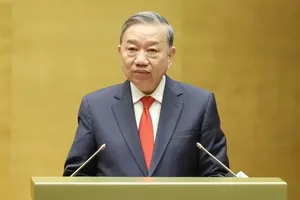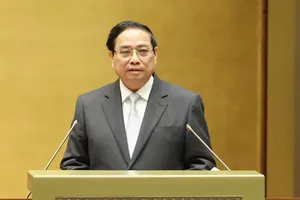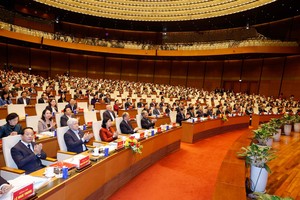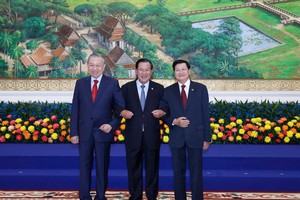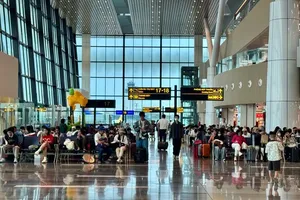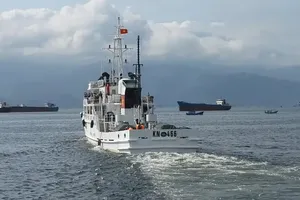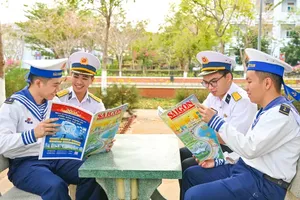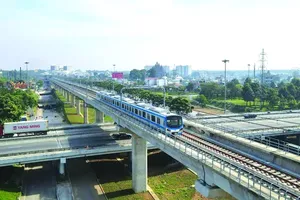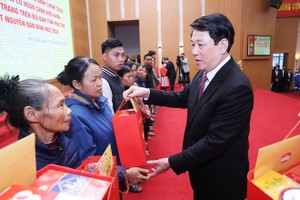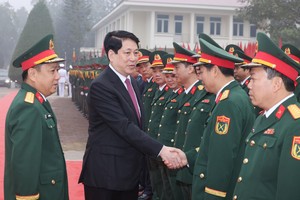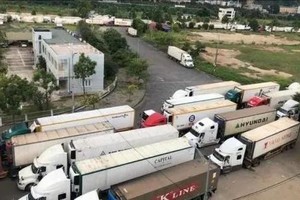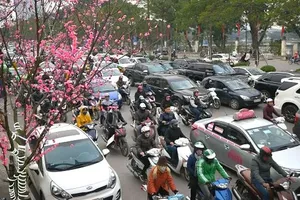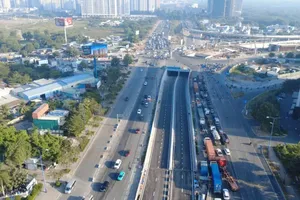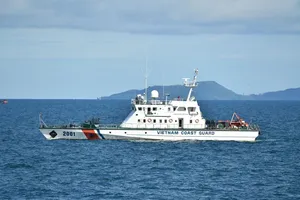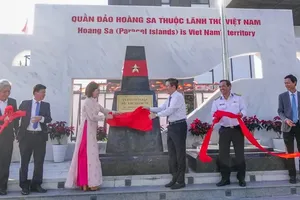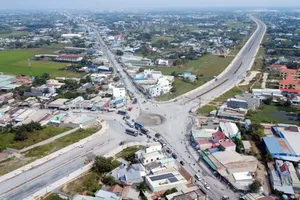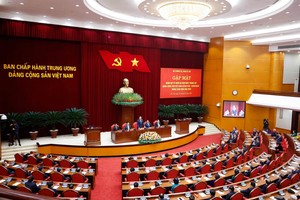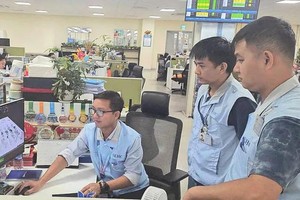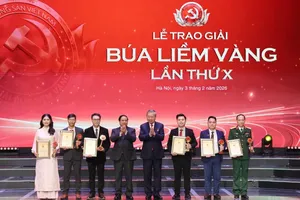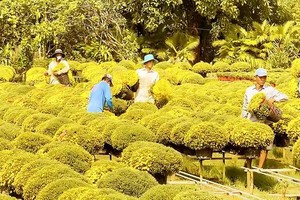Since 2014, the footsteps of Vietnam’s blue-beret peacekeepers have steadily left their mark across numerous countries and territories. They have ventured into conflict zones and impoverished, war-torn regions, standing shoulder to shoulder with the international community to carry out noble missions—contributing to the healing of wounds left by war and strife.
Fulfilling a noble mission
On October 1, 2018, Vietnam's Level-2 Field Hospital No.1 departed for its deployment under the United Nations Peacekeeping Mission in South Sudan. This momentous event marked the first time Vietnam dispatched a full military unit to undertake an international humanitarian duty as part of a peacekeeping mission.
Recalling her days of preparation, Captain Pham Thi Thu Trang shared that, upon receiving her assignment with Level-2 Field Hospital No.1, she made immediate arrangements at home—entrusting her daughter to her parents’ care—so she could fully dedicate herself to the rigorous training required of a UN peacekeeper. The mission demanded strict adherence to standards set by the United Nations in terms of military discipline, capability, and readiness.
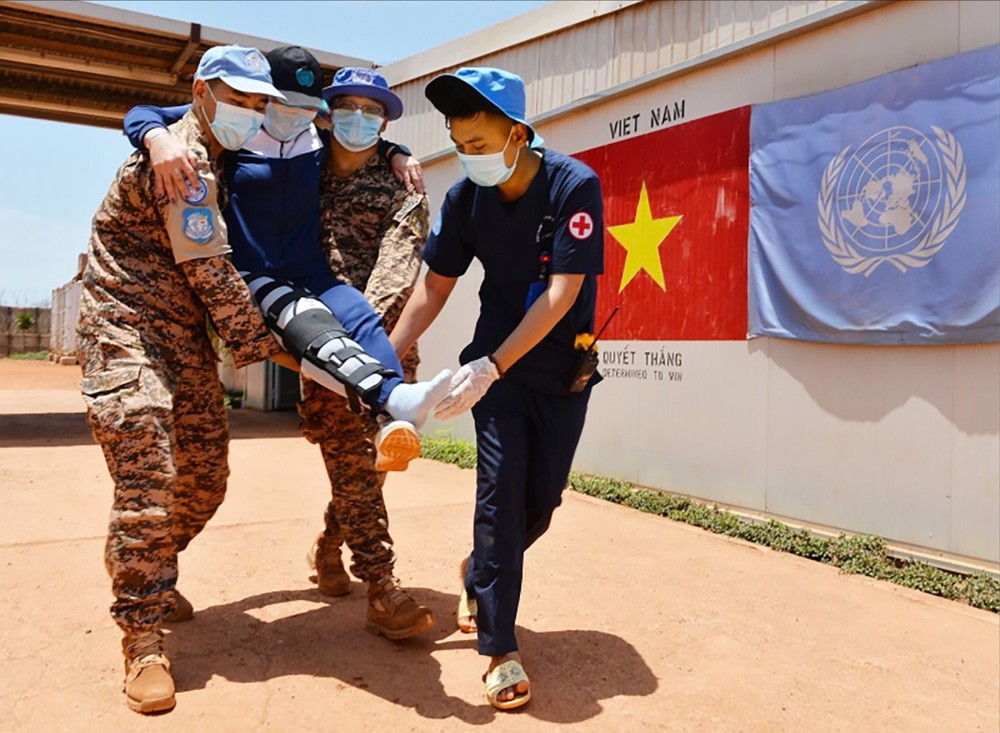
Before her departure, her father offered a heartfelt message: serving in a UN peacekeeping mission is not only a personal honor but a point of pride for the entire family. Having endured the devastations of war, Vietnam deeply values peace. For Vietnamese soldiers to serve in places still afflicted by conflict and poverty is a profound contribution and a privilege.
For Senior Lieutenant Colonel Bui Duc Thanh, Deputy Director of Military Hospital 175, the journey began in late 2014 when he was appointed director of the newly formed Level-2 Field Hospital No.1. He spent more than three years in training and preparation for deployment. The hospital conducted ongoing training programs in peacekeeping operations, logistics, and pre-deployment procedures, while rigorously screening personnel for their foreign language proficiency, professional competence, and moral integrity in accordance with UN standards.
Eventually, a core team of 70 personnel (63 active and seven in reserve) was selected and given extensive training. They were equipped with modern systems that met all the operational criteria set by the UN. In addition to medical skills, every member was trained in survival techniques for the African environment, communications protocols, mine and explosive detection, the UN's rules of engagement, international humanitarian law, sexual misconduct prevention, and other military competencies needed for working independently in the field.
Senior Lieutenant Colonel Bui Duc Thanh acknowledged that one of the toughest challenges was managing the psychological burden among the staff. Many were deeply concerned about the security situation, conflict intensity, and harsh climate in South Sudan. Compounding the pressure was the fact that Vietnam's Level-2 Field Hospital No.1 would be replacing the UK’s Level-2 Field Hospital, which had set a high standard with its professional performance. Therefore, the Vietnamese contingent was driven to meet and exceed expectations.
A profound source of strength for Level-2 Field Hospital No.1 was its sense of unity—like a family. One of the most meaningful aspects of their mission was their civil outreach. Near the hospital were civilian protection camps, and on weekends, Vietnamese personnel often visited to teach local children, donating books, coloring pages featuring Vietnam’s red flag with a yellow star, and images of President Ho Chi Minh and General Vo Nguyen Giap.
"Those images left a deep impression on the children of South Sudan," Senior Lieutenant Colonel Bui Duc Thanh recalled. "When they saw the red flag with a yellow star on our uniforms, they would shout joyfully, ‘Vietnam!’"
UN peacekeeping is a unique mechanism involving voluntary contributions of personnel and resources by member states, under the command of the United Nations and guided by the principles of collective security enshrined in the UN Charter. Vietnam began contributing financially to peacekeeping operations in 1996. Since then, the country has deployed over 1,100 personnel—including officers, professional soldiers, and police officers—to various peacekeeping missions around the world.
Spreading the message of peace
In mid-2024, Captain Tran Thi Thu Trang was deployed to the UN Police Office in Bor, Jonglei State, South Sudan, where she served as an operations officer. She recalled that her posting was in the largest of South Sudan’s ten states—a region facing dire challenges in infrastructure, security, and year-round torrential rains. As one of the most volatile conflict zones, Jonglei posed immense logistical difficulties for all humanitarian operations.
Despite these hardships, Captain Tran Thi Thu Trang constantly reminded herself to excel in her peacekeeping duties, not only to uphold Vietnam’s strong commitment to global peace and security but also to actively support the Women, Peace, and Security Agenda—especially the vital role of women in UN peacekeeping missions.
When she first arrived, the local population knew little about Vietnam, aside from vague recollections of the war against the United States. Through patrols, capacity-building efforts for local police, and various community outreach activities, Vietnamese officers quickly earned the respect and affection of local communities, deepening the image of UN peacekeepers and highlighting the professionalism of Vietnam’s public security forces.
“Serving in volatile, conflict-prone zones has taught me invaluable lessons and become a source of inner strength,” Captain Tran Thi Thu Trang shared.
For Lieutenant Colonel Nguyen Thu Ha, her time with Task Force 2 of UNMISS in South Sudan—from August 2023 to February 2025—was among the most unforgettable experiences of her life. In the first two weeks, she underwent essential orientation training before being assigned to the Malakal Police Office in northern South Sudan—one of the country’s most remote areas. Malakal hosts a Protection of Civilians site with over 30,000 displaced people from various ethnic groups.
“At first, everything felt overwhelming and disorienting,” she recalled. “Malakal has only two seasons—dry and rainy. During the rainy season, the roads turn into mud trails. We had to wear boots; regular shoes were useless. The civilian camp sprawls across a vast plain surrounded by drainage ditches filled with waste. The people here suffer from deep-rooted ethnic hatred. Many are starving, children lack access to education, and violence, revenge killings, and trauma are part of daily life.”
After a month in Malakal, she was transferred to the UN mission’s headquarters to oversee logistics and accommodation—an administrative role, but one that demanded adaptation to diverse international work styles and technical standards.
“Vietnamese people are known for being hardworking and resilient wherever we go. That spirit helped me adapt quickly,” she said. “At the end of our mission, we were honored with medals, commendations, and the respect of international colleagues. It was a proud moment for us as Vietnamese peacekeepers,” Lieutenant Colonel Nguyen Thu Ha expressed deep pride in representing a peaceful nation and contributing to global efforts for stability and humanity.
“Vietnam remains firmly committed to an independent, self-reliant foreign policy that promotes peace, cooperation, and development. We are a trusted partner and a responsible member of the international community,” said General Phan Van Giang, Minister of National Defense. “Vietnam aims to further expand its participation in peacekeeping operations—both in scope and scale of deployment—while also increasing the number of personnel involved in UN-led activities.”
